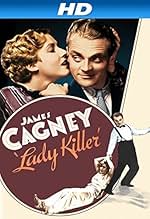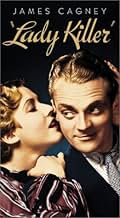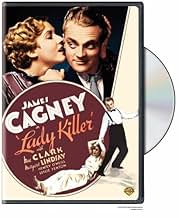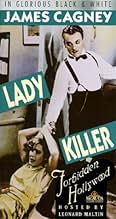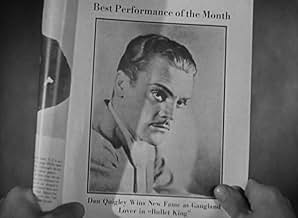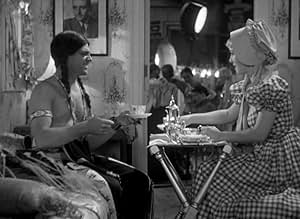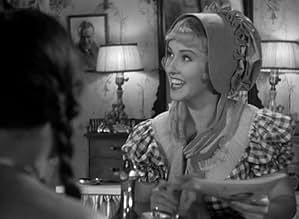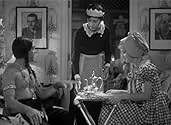IMDb-BEWERTUNG
7,0/10
2133
IHRE BEWERTUNG
Füge eine Handlung in deiner Sprache hinzuA former gangster makes it big in Hollywood, but his old life catches up with him.A former gangster makes it big in Hollywood, but his old life catches up with him.A former gangster makes it big in Hollywood, but his old life catches up with him.
- Auszeichnungen
- 1 wins total
Douglass Dumbrille
- Spade Maddock
- (as Douglas Dumbrille)
William B. Davidson
- Director Williams
- (as William Davidson)
Lowden Adams
- Lois' Butler
- (Nicht genannt)
Luis Alberni
- Director
- (Nicht genannt)
Joseph Belmont
- Monkey Party Guest
- (Nicht genannt)
Brooks Benedict
- Charlie - the Fence
- (Nicht genannt)
Harry Beresford
- Dr. Crane
- (Nicht genannt)
Empfohlene Bewertungen
Lady Killer (1933)
I love these multi-part stories, where one set of scenes shifts to a whole new set, and then they eventually intertwine. And I also love movies that show the inside of Hollywood, with actual recreations of movie sets and movie shoots.
Lady Killer has both, and James Cagney, too. It's fast, furious, funny, and shot with a bright, glinting intelligence. Not quite a gangster film, it does have crime and some crooked thugs. And not quite a comedy, it pulls out quite a few laughs, mostly because Cagney is a card. There are two fabulous first ladies (and they naturally must view for our man), Mae Clark and Margaret Lindsay, and a slew of second men who hold up their characters with caricature.
In all, there is no Warner message here, except maybe the virtue can sometimes prevail. It's just a lot of great scenes, witty dialog, and a play of good guys against bad guys. Look for some stunning rain scenes in California (yeah, I know), and for a huge range of interior and exterior set ups, fairly elaborate for Warner Bros. budgets.
For Cagney fans, it's a riot to see him take on, briefly, a series of roles as Indian chief, Italian lover, and prisoner on work detail. The latter, of course, is close to the real roles that made him famous, and his role here is actually a little lighter than that, a bad guy who is all wisecracks and cheerfulness. Look for some insider jokes, like the poster (and mention) of the Edward G. Robinson film, and the movie ushers wearing hats all with the Warner Brothers logo on it.
Great stuff. I loved it even as I knew it wasn't quite a masterpiece. Oh, and the new (2010) Warner DVD is sparkling, a first rate print!
I love these multi-part stories, where one set of scenes shifts to a whole new set, and then they eventually intertwine. And I also love movies that show the inside of Hollywood, with actual recreations of movie sets and movie shoots.
Lady Killer has both, and James Cagney, too. It's fast, furious, funny, and shot with a bright, glinting intelligence. Not quite a gangster film, it does have crime and some crooked thugs. And not quite a comedy, it pulls out quite a few laughs, mostly because Cagney is a card. There are two fabulous first ladies (and they naturally must view for our man), Mae Clark and Margaret Lindsay, and a slew of second men who hold up their characters with caricature.
In all, there is no Warner message here, except maybe the virtue can sometimes prevail. It's just a lot of great scenes, witty dialog, and a play of good guys against bad guys. Look for some stunning rain scenes in California (yeah, I know), and for a huge range of interior and exterior set ups, fairly elaborate for Warner Bros. budgets.
For Cagney fans, it's a riot to see him take on, briefly, a series of roles as Indian chief, Italian lover, and prisoner on work detail. The latter, of course, is close to the real roles that made him famous, and his role here is actually a little lighter than that, a bad guy who is all wisecracks and cheerfulness. Look for some insider jokes, like the poster (and mention) of the Edward G. Robinson film, and the movie ushers wearing hats all with the Warner Brothers logo on it.
Great stuff. I loved it even as I knew it wasn't quite a masterpiece. Oh, and the new (2010) Warner DVD is sparkling, a first rate print!
If you like James Cagney, and I sure do, you'll love this comedy melodrama from the pre-code years at Warner Brothers. Cagney portrays a cheap hoodlum who falls in with a gang of petty con artists, gets wrapped on the knucklesl by the long arm of the law, and winds up becoming a movie matinee idol. It's fun all the way, with enough wise-cracking dialogue, rapid action, car chases, gunfire, and double-dealing to satisfy any fan of the early gangster films, yet it's a lively, tongue-in-cheek comedy from start to finish. Enjoy!
When you think of James Cagney, you think of a gangster in films like The Public Enemy, where he smashed that grapefruit into Mae Clarke's face. But Cagney won his Oscar for Yankee Doodle Dandy. He also received nominations for Angels With Dirty Faces and Love Me or Leave Me.
Here he shows just how far his range extends in a romantic comedy which also includes Mae Clarke in a bigger role than you are probably accustomed to seeing her. There is a lot of action in this 76 minute film. Cagney is a theater usher who gets fired and ends up following Mae as she is trolling for suckers to get fleeced by her partners in a card game. He joins the group and they pull bigger more sophisticated cons until a trigger happy gang member kills a servant during a home robbery.
He and Mae head to Los Angeles, and when the LA police hold him for what happened in New York, Myra and one of the gang make off with Cagney's money. The LA police ultimately have to let him go, but penniless he gets increasingly shaggy and ragged looking. This causes him to get picked up for a series of bit parts by a local movie crew exactly because of his scruffy looks. One of the fascinating bits here is seeing how movies were made at the time. He hooks up with star Margaret Lindsay and uses his conning skills to make himself a star. (As an aside, Lindsey made 12 films that year, her second year as an actress.)
Soon, Mae and the gang find him and they want to pick up where they left off, using Cagney to get into posh places that they can rob. He tries to get them out of town, but they see dollars in LA and are going nowhere. How will this all work out? Watch and find out. And like I said, there's a lot of action for 76 minutes and Cagney really shows he can do romance, comedy, and gangster all in one film.
Here he shows just how far his range extends in a romantic comedy which also includes Mae Clarke in a bigger role than you are probably accustomed to seeing her. There is a lot of action in this 76 minute film. Cagney is a theater usher who gets fired and ends up following Mae as she is trolling for suckers to get fleeced by her partners in a card game. He joins the group and they pull bigger more sophisticated cons until a trigger happy gang member kills a servant during a home robbery.
He and Mae head to Los Angeles, and when the LA police hold him for what happened in New York, Myra and one of the gang make off with Cagney's money. The LA police ultimately have to let him go, but penniless he gets increasingly shaggy and ragged looking. This causes him to get picked up for a series of bit parts by a local movie crew exactly because of his scruffy looks. One of the fascinating bits here is seeing how movies were made at the time. He hooks up with star Margaret Lindsay and uses his conning skills to make himself a star. (As an aside, Lindsey made 12 films that year, her second year as an actress.)
Soon, Mae and the gang find him and they want to pick up where they left off, using Cagney to get into posh places that they can rob. He tries to get them out of town, but they see dollars in LA and are going nowhere. How will this all work out? Watch and find out. And like I said, there's a lot of action for 76 minutes and Cagney really shows he can do romance, comedy, and gangster all in one film.
"Lady Killer" represents a combination of talents Hollywood will never see again. There is fast talking James Cagney, who starts the movie as a dice playing, gum chewing usher who makes wise guy, but funny, comments to everyone. In Cagney's opening scene, he just makes it to a count out of the 25 ushers, held on the roof of the movie theater they work at. All wear Warner Bros. uniforms, including a cap with the WB logo on it. As Cagney advances in life, he becomes a partner in a gambling operation. One of his confederates slugged too hard a maid and almost kills her during a home robbery, another criminal activity Cagney's gang is involved in. Cagney tells the confederate (played by a snarling Leslie Fenton), what does he think, the police are dumbbells. Dumbbell was a favorite word of screenwriter Ben Markson, who used it to good advantage in another movie he co-wrote, "Gold Diggers of 1933."
Roy Del Ruth does his usual super job, cramming a ton of action into 76 minutes. There is one scene,where the cab of Mae Clarke's character is stopped at one of those old traffic devices, which has two signal vanes, one marked stop, and the other go. The stop signal goes up, another of Cagney's partners,Douglas Dumbrille, happens to be in the adjacent cab, he gets into Clarke's. He tells her "things are plenty hot in New York, I just jumped my bail and beat it out here by plane," to Los Angeles.
Meanwhile, Cagney is being questioned by the LA police, who previously picked him up at the train station on a New York warrant. Cagney tells the police chief, he went West for the climate, on account of his asthma. This scene represents the first mention I know of asthma in a mainstream movie. Later, after Cagney is sprung loose, Brannigan, the cop (played by Robert Elliot, almost typecast to cop roles in the 30s) who first pulled him in at the train station, tells him that if he doesn't find a job, he will be picked up as a "vag" (for vagrant) and get 30 days in jail.
When you look at this scene, notice the outline of the Venetian blinds on the office wall, and the dark shadows falling on the the faces of the Chief, Brannigan and Cagney's character. This scene, and the subsequent scene of Cagney trying to keep a low profile in a pool hall, unshaven and furtive, look as if they were from a film noir movie, only these scenes were made more than 12 years before the film noir cycle started.
The scenes showing Cagney working as a movie extra show how movies were made in the early 1930s, at least according to Roy Del Ruth. There is a scene of Cagney as an Indian chief on an imitation horse riding in front of a back projection screen, the movie director shouting, with a heavy European accent, "Ride, That A Boy!" Later, on a 15 minute lunch break, box lunch in hand, Cagney identifies himself to his future girlfriend, Margaret Lindsay as a Chief with the name, said in Yiddish, Pain In The Ass. I could be off in the translation, but Cagney used a Yiddish phrase.
The movie plot has one unexpected connection to real life. In 1939, there was a New York gangster named Greenbaum, nicknamed "Big Greenie." As I recall, from reading Burton Turkus's book, "Murder, Inc." years ago, Greenbaum fled to the West Coast, where he worked as an extra in movies while avoiding Lepke's killers. Greenbaum knew too much, and Lepke eventually managed to have "Big Greenie" killed.
"Lady Killer" was made in 1933 fast, by great talents. I saw it playing the laserdisc of the movie, part of the double laserdisc of James Cagney movies that Image released in 1992. The second movie on the LD set, "Blonde Crazy," made in 1931, is good also, but the advances made in movie making in two years are really something, comparing the two movies.
There is only one slight flaw in "Lady Killer." In every other pre-Code movie I saw from Warner Bros., when someone reads a telegram, you see the telegram message on screen, the telegram made by the prop department. When the LA police chief shows a telegram to Cagney, explaining the situation, he tells him New York authorities asked him to hold Cagney's character. You never see the actual telegram message, Warners usual practice then, a practice not usually followed by other studios. Maybe Warners' prop department did prepare a fictitious telegram but movie director Roy Del Ruth thought it looked "fakey."
Roy Del Ruth does his usual super job, cramming a ton of action into 76 minutes. There is one scene,where the cab of Mae Clarke's character is stopped at one of those old traffic devices, which has two signal vanes, one marked stop, and the other go. The stop signal goes up, another of Cagney's partners,Douglas Dumbrille, happens to be in the adjacent cab, he gets into Clarke's. He tells her "things are plenty hot in New York, I just jumped my bail and beat it out here by plane," to Los Angeles.
Meanwhile, Cagney is being questioned by the LA police, who previously picked him up at the train station on a New York warrant. Cagney tells the police chief, he went West for the climate, on account of his asthma. This scene represents the first mention I know of asthma in a mainstream movie. Later, after Cagney is sprung loose, Brannigan, the cop (played by Robert Elliot, almost typecast to cop roles in the 30s) who first pulled him in at the train station, tells him that if he doesn't find a job, he will be picked up as a "vag" (for vagrant) and get 30 days in jail.
When you look at this scene, notice the outline of the Venetian blinds on the office wall, and the dark shadows falling on the the faces of the Chief, Brannigan and Cagney's character. This scene, and the subsequent scene of Cagney trying to keep a low profile in a pool hall, unshaven and furtive, look as if they were from a film noir movie, only these scenes were made more than 12 years before the film noir cycle started.
The scenes showing Cagney working as a movie extra show how movies were made in the early 1930s, at least according to Roy Del Ruth. There is a scene of Cagney as an Indian chief on an imitation horse riding in front of a back projection screen, the movie director shouting, with a heavy European accent, "Ride, That A Boy!" Later, on a 15 minute lunch break, box lunch in hand, Cagney identifies himself to his future girlfriend, Margaret Lindsay as a Chief with the name, said in Yiddish, Pain In The Ass. I could be off in the translation, but Cagney used a Yiddish phrase.
The movie plot has one unexpected connection to real life. In 1939, there was a New York gangster named Greenbaum, nicknamed "Big Greenie." As I recall, from reading Burton Turkus's book, "Murder, Inc." years ago, Greenbaum fled to the West Coast, where he worked as an extra in movies while avoiding Lepke's killers. Greenbaum knew too much, and Lepke eventually managed to have "Big Greenie" killed.
"Lady Killer" was made in 1933 fast, by great talents. I saw it playing the laserdisc of the movie, part of the double laserdisc of James Cagney movies that Image released in 1992. The second movie on the LD set, "Blonde Crazy," made in 1931, is good also, but the advances made in movie making in two years are really something, comparing the two movies.
There is only one slight flaw in "Lady Killer." In every other pre-Code movie I saw from Warner Bros., when someone reads a telegram, you see the telegram message on screen, the telegram made by the prop department. When the LA police chief shows a telegram to Cagney, explaining the situation, he tells him New York authorities asked him to hold Cagney's character. You never see the actual telegram message, Warners usual practice then, a practice not usually followed by other studios. Maybe Warners' prop department did prepare a fictitious telegram but movie director Roy Del Ruth thought it looked "fakey."
If you want to know how James Cagney become such a huge star, just watch this - not quite this story about a con man who becomes a Hollywood star but how he outshines the rest of the cast. Even though they are all passable actors, Cagney is somehow in a different league. The downside was that by outshining his co-stars, their contributions make the whole film seem a little amateurish. The upside was that to keep up with him eventually everyone had to get up to his standard but this hadn't quite happened by 1933.
This film is super-fast, super-snappy and both reasonably funny and gripping at the same time. Overseen by Warner's production head Daryl Zanuck, it was written specifically for Cagney to highlight his own particular talents and loveable rogue personality.
Warner Brothers knew exactly what they were doing - making a star and making a lot of money but didn't account for Cagney's demands for staggeringly enormous wages. They did their sums and reluctantly always gave in - just watching him in this you can see why.
This film is super-fast, super-snappy and both reasonably funny and gripping at the same time. Overseen by Warner's production head Daryl Zanuck, it was written specifically for Cagney to highlight his own particular talents and loveable rogue personality.
Warner Brothers knew exactly what they were doing - making a star and making a lot of money but didn't account for Cagney's demands for staggeringly enormous wages. They did their sums and reluctantly always gave in - just watching him in this you can see why.
Wusstest du schon
- WissenswertesFor the scene when Dan Quigley hauls Myra Gale across the apartment floor by her hair and throws her out the door, James Cagney taught his co-star Mae Clarke an old stage trick. When Cagney grabbed hold of Clarke's hair (holding her by the top of her head), Clarke reached up and grabbed Cagney's wrist with both hands. This put her weight on Cagney's wrist, instead of on her hair. Clarke then held on to Cagney's wrist, screaming, as he dragged her across the room.
- PatzerAfter the robbery of the wealthy woman's home, the paper says a maid was struck and seriously injured, and later in Dan Quigley's office, they're still talking about a maid who screams. Later, when the guy who actually hit her comes back scared, he says the butler died.
The owner of the house where Dan was taken after the "car accident" was Mrs. Wilbur Marley. This was the house where the maid was "slugged". The butler who "croaked" was "on the Crosby job".
- Zitate
Spade Maddock: [discussing diamond-studded Mrs. Marley at the gang's speakeasy] C'mere - take a gander at her.
Dan Quigley: [eyeing her through a peephole] Did you say "gander?" I wonder how she'd go for a goose.
- VerbindungenFeatured in Hollywood: The Great Stars (1963)
- SoundtracksIsn't It Heavenly
(1933) (uncredited)
Music by Joseph Meyer
Lyrics by E.Y. Harburg
Played when Myra invites Dan into her apartment.
Top-Auswahl
Melde dich zum Bewerten an und greife auf die Watchlist für personalisierte Empfehlungen zu.
- How long is Lady Killer?Powered by Alexa
Details
- Erscheinungsdatum
- Herkunftsland
- Sprachen
- Auch bekannt als
- Lady Killer
- Drehorte
- Hinman Hotel, 7th Street and Figueroa Street, Los Angeles, Kalifornien, USA(The opening scene with the theater manager addressing his ushers in military formation is filmed on the rooftop of this hotel building)
- Produktionsfirma
- Weitere beteiligte Unternehmen bei IMDbPro anzeigen
- Laufzeit
- 1 Std. 16 Min.(76 min)
- Farbe
- Sound-Mix
- Seitenverhältnis
- 1.37 : 1
Zu dieser Seite beitragen
Bearbeitung vorschlagen oder fehlenden Inhalt hinzufügen


